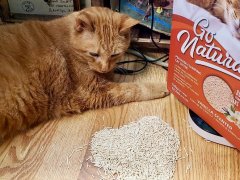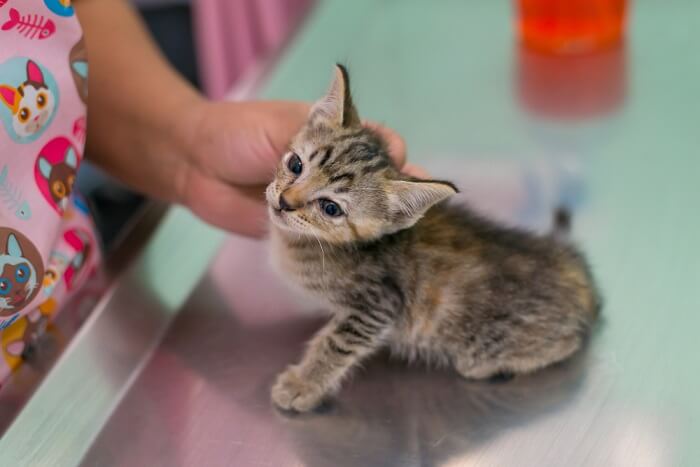
- Types Of Worms In Cats
- How Do Cats Get Worms?
- Symptoms Of Worms In Cats
- Diagnosis Of Worms
- Deworming Your Cat
- Types Of Dewormers
- What Formulations Of Wormer Are Available?
- How To Deworm A Cat
- What Wormer, Precisely, Is Best For My Kitten Or Cat?
- How To Prevent Worms In Cats
- Natural Home Remedies For Worms In Cats
- Frequently Asked Questions
Worms are common internal parasites of cats, and regular year-round deworming is an important part of good cat health care. The aim of this article is to explain the background to worms, and to give information about how cat carers should deworm their pets effectively
Types Of Worms In Cats

There are a number of worms that can infect cats, and to some extent, there are significant geographical variations in the prevalence of these different parasites.
The most common worms live in the cat’s digestive tract, usually in the intestines.
Common intestinal parasites are listed below:
- The most common roundworms are Toxocara cati and Toxascaris leonina
- Other common intestinal worms are Gnathostoma species, Physaloptera species, Strongyloides species, whipworms, and hookworms (Ancylostoma tubaeforme, Uncinaria stenocephala and other species).
- The most common tapeworms are Dipylidium caninum and Taenia taeniaeformis.
- Other less common tapeworms include Diphylobothrium latum, Spirometra species, Diplopylidium species, Joyeuxiella species, and Echinococcus multilocularis
- There is also a stomach worm, called Ollulanus tricuspis
In some parts of the world, there are worms that can infect other parts of the cat’s body.
- Heartworms (Dirofilaria immitiss)
- Lungworms (Aelurostrongylus abstrusus and Capillaria species)
- Eyeworms ( Thelazia callipaeda)
This may look like a frighteningly long list of cat’s worms, and it’s important to remember that simple control measures are usually enough to prevent these creepy crawlies from harming your cat or yourself.
How Do Cats Get Worms?

Cats get hookworms when they ingest hookworm larvae, typically when walking on a contaminated surface. Cats may pick up hookworms through their skin or during grooming.
The life cycle of each specific worm is different, and range from the common roundworm which kittens can pick up from their mother’s milk, to the common tapeworm which cats can pick up from ingestion of fleas from their coat, to other tapeworms which cats can pick up from prey (such as small mammals, birds amphibians or reptiles) when hunting. Infected cats can pass worms on to other cats via worms or segments in their feces.
Symptoms Of Worms In Cats

Most cats with worms don’t show any signs of illness: a low level of worms can exist without causing any harm. However, heavy worm burdens of intestinal parasites can cause an infected animal to suffer gastrointestinal upsets (vomiting and/or diarrhea), weight loss, anemia, a dull coat, poor general condition, and sometimes irritation around the anus.
Furthermore, some worms can be passed on to humans, very rarely causing serious illness.
For these reasons, it makes sense to give cats regular anti-worm medication, to prevent problems.
Diagnosis Of Worms

To make a specific, definite, diagnosis of worm infestation, a sample of your cat’s feces can be collected from your cat’s litter box and sent to a laboratory to search for worm eggs, larvae or adult worms.
However, there is an incidence of “false negatives” from fecal samples i.e. even if no signs of worms are found, it is still possible that your cat could have worms.
Pet owners may carry out their own simple fecal exam by physically examining their cat’s stool. They may see adult worms, or tapeworm segments (these resemble flattened grains of rice).
However roundworm eggs are microscopic and are unlikely to be visible to the naked eye.
For this reason, it’s usually recommended that all cats should be given routine worm doses, on a schedule throughout their lives.
Deworming Your Cat
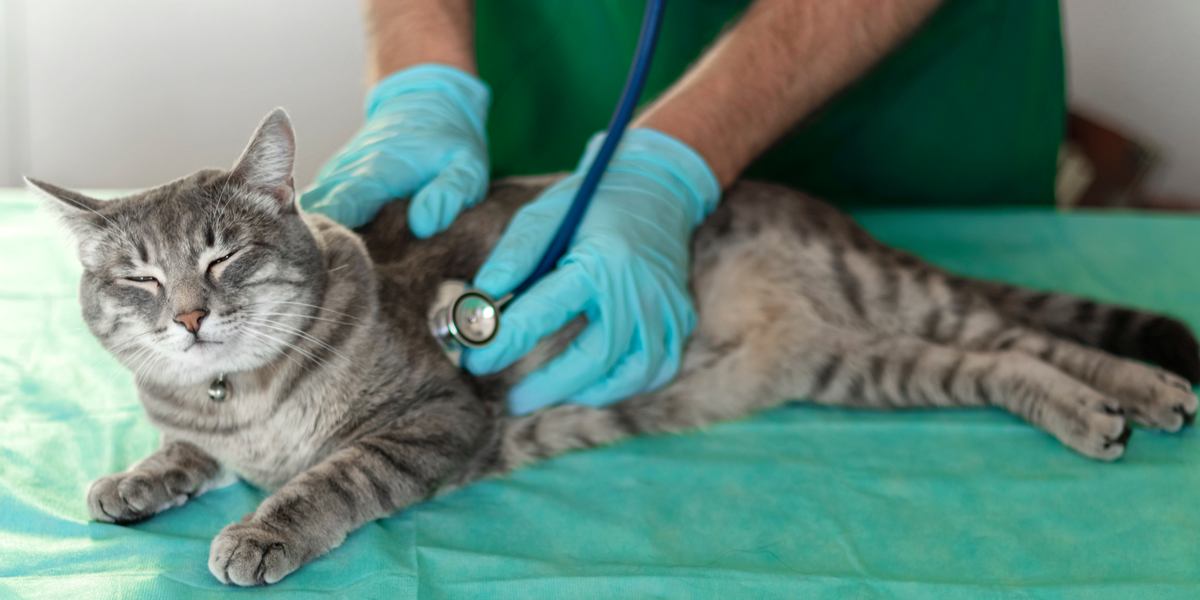
Typically, adult cats (over six months of age) should be treated for worms every 1-3 months using a broad spectrum wormer (i.e. one that is effective against both roundworms and tapeworms).
Indoor cats are less likely to pick up worms, so less frequent worming is recommended (eg every three months), while outdoor cats that hunt should be wormed more frequently (e.g. every month).
Kittens and younger cats (less than six months of age) should be wormed more often, as roundworms are very common in kittens (they pick them up from their mother’s milk, when suckling.
In general, kittens should be treated for roundworms 2 weeks from 3 weeks of age until 8 weeks of age, then monthly to 6 months of age. A roundworm-specific wormer should be sufficient because tapeworms are not usually a problem in kittens unless they have fleas. If they do have fleas, a broad spectrum wormer should be used.
Types Of Dewormers

As mentioned above, kittens may need only roundworm treatments, while older cats need to have a wider range of parasites included. It’s worth having a conversation with your local veterinarian to learn what type of worms need to be controlled in your own area, for your specific pet.
A wide range of worming medication is available, with precise product availability varying from country to country.
In general, wormers are one of two types:
- Products for specific worms e.g. roundworm, tapeworm, heartworm etc
- So-called broad spectrum products, which treat for multiple different types of worms in a single formulation (e.g. roundworms, tapeworms and heartworm)
Some worming products are available over-the-counter in supermarkets and pet shops, but these tend to be the older types of drugs that may not be as effective or easy to use as the more recently developed products which are often sold only as prescription medications via restricted outlets such as veterinary clinics.
The precise active ingredients are important, and there are too many of these to list comprehensively.
However the following are commonly found:
- Pyrantel pamoate is commonly included to treat roundworms and hookworms
- Praziquantel may be included with Pyrantel pamoate in a tablet: this is highly effective against tapeworms, so the combination of the two is a broad-spectrum product.
Side effects of deworming medications are generally minimal.
What Formulations Of Wormer Are Available?

Deworming medication can be given to cats in different ways.
- Worm tablets are the traditional method of cat deworming. These can be designed to be administered directly to a cat or they may be palatable tablets, designed to be mixed with the food.
- Wormer pastes to be given orally may be available.
- Spot-on formulations (liquid in a plastic vial, to be applied to the skin on the back of the neck) are now often available.
- Injectable versions of some wormers (to be administered by your DVM veterinarian) may be recommended in some situations.
How To Deworm A Cat
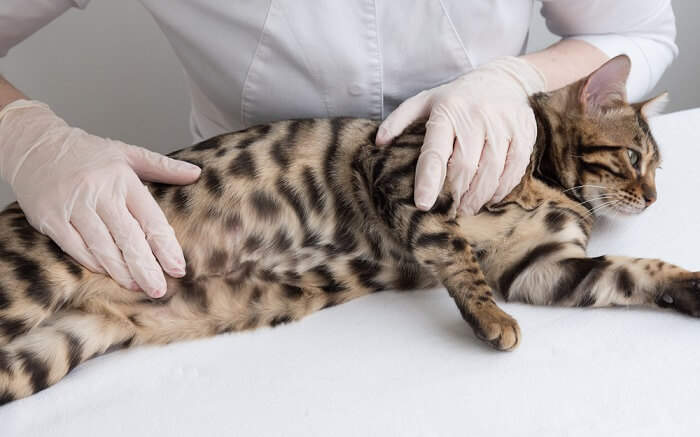
- If you are able to give a tablet to your cat yourself, this can be the most direct method.
- You can mix the wormer with some tasty food.
- You can use a spot-on product on the back of your cat’s neck.
- A wormer can be given as an injection, from your veterinarian.
What Wormer, Precisely, Is Best For My Kitten Or Cat?
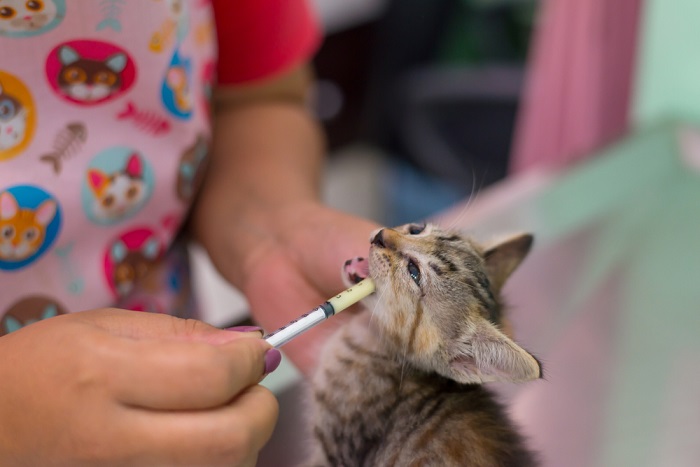
The vet will suggest you the most effective treatment, based on the types of worms common in your area.
It is always better to seek the advice of your vet during a routine wellness visit. They will know what types of worms are common in your area. They will also be able to suggest the most effective, easiest and safest wormers for your cat.
How To Prevent Worms In Cats

The best way to prevent worms is to give a regular worm dose, as recommended for your particular cat, with their individual lifestyle in your specific area. Broad recommendations on frequencies are listed above.
Natural Home Remedies For Worms In Cats

Cat owners should be careful before giving any home remedies to cats: they can be especially vulnerable to toxicities and harmful effects from medication that may be well tolerated in other species like dogs and humans. It’s best to follow your veterinarian’s advice when selecting worm treatments.
Commonly mentioned products such as garlic, pumpkin seeds, sage, oregano or thyme, or homeopathic products, do not reliably kill worms, and cannot be recommended.
Worms are common parasites in cats, and a preventive approach, with regular use of broad spectrum wormers, is the best way to avoid problems.
Frequently Asked Questions
What is the easiest way to worm a cat?
The easiest way depends on your cat. If you are able to give a tablet to your cat yourself, this can be simple. If your cat won't let you, then you can try medication mixed with some tasty food. If your cat refuses this, you may wish to use a spot-on product on the back of your cat's neck. Finally, sometimes a wormer can be given as an injection, from your veterinarian.
What can I give my cat to deworm?
There are different products available, as listed above. You can choose an over-the-counter broad spectrum wormer, or you may prefer to ask your veterinarian to suggest the most effective and easiest deworming product for a cat living in your area.
What happens if you don’t deworm a cat?
If cats are not dewormed, they are at risk of picking up heavy worm burdens that can make them unwell. There is also a small risk that they can carry worms that may be infectious to their human carriers.
How do you know if your cat needs to be dewormed?
If you see symptoms caused by worms, or if you see evidence of worms in your cat's stools, then a worm dose needs to be given immediately. As part of general cat care, all cats should be dewormed routinely, at least once every three months, so that a worm infestation is never allowed to develop.

